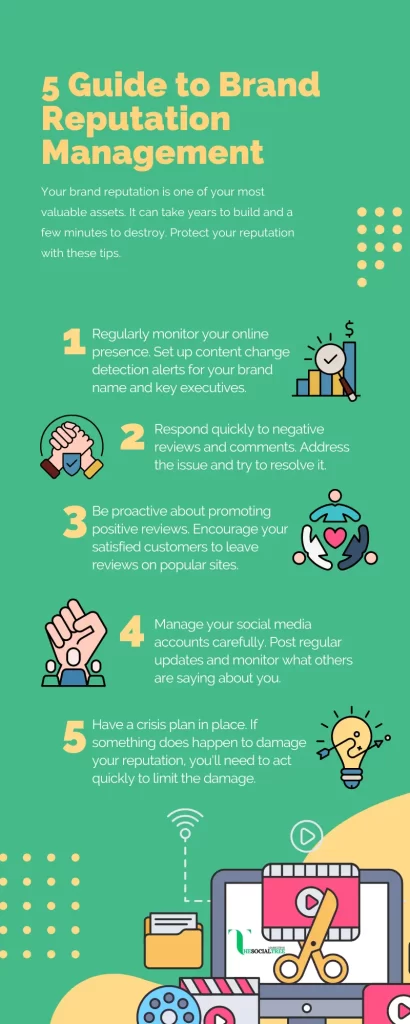Table of Contents
ToggleBrand Reputation
Brand reputation means how people recognize a company and its products or services. Brand reputation also indicates how customers, workers, and the public think and feel about the brand. This recognition and thinking can be positive, negative, or neutral.
However, product quality, customer service, and marketing efforts are the main factors on which a brand’s reputation depends.
A good reputation shows people like and rely on the brand. There are many brands all over the world. But some of them are highly regarded. These famous brands produce superior products and provide exceptional customer service. That’s why people trust and admire these brands, Gucci, Nike, and Bata are examples of such brands.
Conversely, when people have adverse opinions about a brand, it indicates infamy for the brand. There are some reasons for this. Poor customer service, inferior products, and mismanagement are the reasons for a bad reputation for a brand. A poor reputation can also drive customers away. A bad reputation may also damage the success of the company.
Moreover, brand reputation impacts the customers as well as the workers. Workers feel proud to work for a reputable company. This sense of pride can increase productivity. On the other hand, when a brand has a poor reputation, it shows low workers’ confidence and reduced productivity.
Furthermore, a positive brand reputation can enhance the relationships between a company and its collaborators. A strong reputation also boosts trust, engagement, and sales. In contrast, a company with a poor reputation fails to secure funding and partnerships.
It is necessary to maintain a positive reputation for holding customers. A strong reputation is also required for building strong relationships. Thus, a company in disfavor cannot achieve its desired goals. It is a fact that businesses with strong reputations can stand out in this crowded market.
“Your Brand Name is Only as Good as Your Reputation.”
By: Richard Branson
Benefits of Brand Reputation
There are many benefits to a brand’s reputation. A brand’s reputation can enhance customer trust and credibility. A strong brand reputation can foster a sense of loyalty. Besides, a strong reputation is also helpful in building relationships with stakeholders. Ultimately, it can increase sales and revenues.
1- Enhance customer trust and loyalty
If a brand has a strong reputation, customers will trust it. Trust is an important aspect of buying something. When the quality of your products or services is good, it increases the customers’ trust in your brand. As well as that, they become loyal to your brand. In addition, this trust increases lead generation and leads to conversions. Eventually, it increases your return on investment.
2- Better relationships with stakeholders
A strong reputation impacts stakeholders. These stakeholders can be investors, workers, and partners. Workers feel confident and motivated to work for a highly regarded company. Similarly, investors are more likely to invest in a reputed business. Partners also prefer to associate with companies that have a good reputation.
3- Enhance sales and revenues
A good brand reputation automatically increases your sales and revenues. Customers are more probably to make purchases from a brand that has a good reputation. Not only that, but they also recommend it to others. Positive feedback can also captivate new customers.
4- Increase financial performance
A brand with a strong reputation performs well financially. People can use the products or services of a brand that has a strong reputation. So, this possibility increases sales. As a result, conversion rates become high. Ultimately, a brand earns more money and fame.
5- Crisis persistence
A strong reputation for a brand can protect it in a crisis. When any problem arises, a good reputation can handle the situation and resolve the issue nicely. When customers have a good experience with the brand, they become loyal. These loyal customers advocate for the brand in grief and maintain its positive image.
Brand reputation management
- Regular Monitoring
- Quick Response
- Consistent Promotion
- Social Media Reputation
- Crises Plan
Observing and determining the reputation of a brand is called brand reputation management. This process observes and determines how people recognize your brand. Brand reputation management involves necessary steps to create a positive image of the brand.
Moreover, the brand reputation management process is required to maintain and increase the satisfaction of your customers. BRM* steps are continuously checking public emotions, engaging with customers, solving their issues, and establishing good relationships.
Furthermore, the brand management process has many factors. This process requires careful observation, responsiveness, and strategic steps. Monitoring and tracking social media are also necessary to maintain your brand’s online reputation.
A good brand reputation management process helps keep old customers and captivates new ones. This process also showcases the brand’s dedication to customer satisfaction. In addition, Brand reputation management also focuses on building loyal customers who advocate for the brand.
Additionally, brand reputation management also provides ways to deal with negative feedback. A good brand reputation will help you in your company’s growth.

Importance of brand reputation management
Firstly, when a brand has a good reputation, people trust it. They become loyal to it. People are more willing to purchase your products or services and recommend them to others. Customers’ loyalty and trust in your brand increase the conversion rates and chances of your success.
Secondly, a good brand reputation can give a company a competitive advantage. A good reputation also helps you stick out in a crowded market. People prefer brands with a strong reputation over others. They become supporters of the brand.
Thirdly, successful brand reputation management can also reduce the effects of weak events. When a brand faces a scandal, how it handles this situation has a strong impact. A prompt reply or response to customer queries can build trust and prevent harm to brands’ reputations.
Effective brand reputation management
Effective brand reputation management is necessary for a brand or company to achieve its desired goals. Different actions may help to create a good reputation for a brand. These actions are also called steps for effective brand reputation management. The brand reputation management steps included monitoring online presence, engaging with customers, providing outstanding customer service, maintaining transparency, and promoting positive content.
Steps to consider
1- Monitor online presence
It is very important to know how people recognize your brand to regulate your brand reputation online. This consists of continuous monitoring of social media and review sites. You may also use different tools, like Google Alert, to stay updated.
2- Engage with customers
The most analytical element of brand reputation management is engagement with customers. It is necessary to respond to customers when they leave comments or reviews. These reviews or comments can be positive or negative. One important thing is the appreciation of customers when they provide positive feedback. This appreciation leads to a strong reputation for the brand.
3- Provide outstanding customer service
The core of successful brand reputation management is providing outstanding customer service. You should train your workers to handle negative feedback and inquiries efficiently. Furthermore, your customer service should be exceptional. When your customer service is good, your customers feel good. They also leave positive reviews. In addition, customers are more likely to purchase your products or services. They also recommend your brand to others.
4- Maintain Transparency
Transparency is essential to establishing trust and credibility. Companies should be trustworthy in all conditions with their customers. Whenever any problem arises, accept it, explain what happened, and tell your customers how you are solving it. This can be helpful to maintain your trust when something goes wrong.
5- Publicity of positive content
Positive content is helpful to maintain your strong reputation. Your content should include references, success stories, and certificates or rewards your brand has received. Not only that, it is also important to share this content on your website or other social media platforms to increase your brand’s image.
Hence, you can effectively manage the reputation of your brand by employing these useful steps. These steps can be used to create a good reputation that can drive permanent success for your brand.
Benefits of brand reputation management
Brand reputation management has numerous benefits. It enhances the trust and loyalty of your customers. Brand reputation management can also increase a competitive edge.
Moreover, brand reputation management focuses on crisis handling and positive engagement. Additionally, it can help you to provide outstanding customer service.
1- Crisis management
Every business faces problems. However, how you handle the situation will affect your brand reputation. You need to understand that it is necessary to respond to every complaint or issue promptly. It is only possible with effective brand reputation management. Eventually, It will reduce harm and maintain customer trust.
2- Strength against negative promotion
Companies with authentic reputation management systems provide better solutions in case of negative promotions. When a negative event happens, a brand with a strong reputation management can manage it easily. It depends on its positive history to handle the situation. Good reputation management guarantees that stakeholders and customers remain supportive in such conditions. They become fighters against negative publicity and maintain the reputation of their brand.
3- Increase customer experience
A good reputation management helps you to improve customer service. Providing exceptional customer service and engaging with them can increase the customer experience. When customers are satisfied and feel valued, they leave positive reviews. Furthermore, satisfied customers make purchases repeatedly and recommend your product to others. Ultimately, this satisfaction leads to long-lasting success.
4- Global Expansion
Brand management helps expand your business on an international level. When a brand is reputable in its own country, it is often welcomed in other countries. People from other countries are more likely to use the products or services of international brands. In this way, a good reputation can turn a local brand into an international brand.
5- Boosting Advertising and Conversions
Brand reputation management also focuses on better advertising. When people see the ads and commercials of a brand, they are more likely to use the products or services of that brand. They can also easily recall the brand. Finally, this advertisement leads to high conversion rates.
In conclusion, brand reputation and management are mandatory in this digital era. A good reputation can increase the trust and loyalty of customers. Not only that, but a positive brand reputation also builds strong relationships with stakeholders and ultimately increases the conversion rate. You should also have an authentic system of brand reputation management.
To sum up, companies can boost trust, brand loyalty, and overall brand reputation with effective brand reputation management. Moreover, businesses can establish and maintain a reputation by emphasizing positive engagement, exceptional customer service, and enhancing the customer experience.

